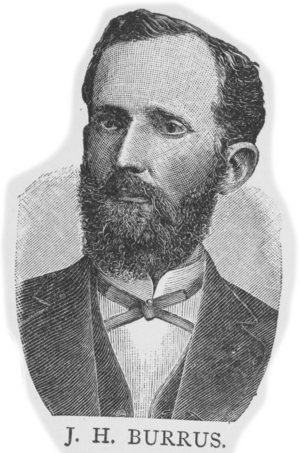John Houston Burrus facts for kids
Quick facts for kids
John Houston Burrus
|
|
|---|---|

Image of Burrus from 1887
|
|
| Born | February 22, 1849 |
| Died | March 27, 1917 (aged 68) Nashville, Tennessee, U.S.
|
| Alma mater | Fisk University |
| Occupation | educator |
| Political party | Republican |
| Signature | |
John Houston Burrus (born February 22, 1849 – died March 27, 1917) was an important teacher and leader. He worked in Nashville, Tennessee, and Lorman, Mississippi. He was one of the very first students at Fisk University in Nashville. When he graduated, he became one of the first African Americans to earn a college degree in the Southern United States. Later, he taught math at Fisk. From 1883 to 1893, he was the second president of Alcorn Agricultural and Mechanical College.
Contents
Early Life and Education
John Houston Burrus was born on February 22, 1849. His birthplace was near Murfreesboro, Tennessee. His mother, Nancy, was enslaved by his father, William C. J. Burrus. William was a lawyer and a planter. Nancy was of mixed heritage.
John had two brothers, James Dallas Burrus and Preston Robert Burrus. Their parents lived together like a married couple. William never officially married Nancy. James later said their parents had a loving relationship.
Life During the Civil War
William died in 1860. After his death, John, his brothers, and his mother went to live with William's brother. His mother worked as a cook. The brothers served as personal assistants. They stayed with their master during the American Civil War (1861-1865).
When the war ended, John and his family were in Marshall, Texas. They were finally free. They traveled to Shreveport, Louisiana, then to New Orleans. From there, they went to Memphis, Tennessee. John found a job as a cook on a steamboat.
Starting College at Fisk University
In 1866, John moved to Nashville. He and James worked as hotel waiters. At night, they studied with two women staying at the hotel. They saved money and learned a lot.
By 1867, they had enough to enroll at Fisk University. America W. Robinson and Virginia Walker were also among the first students. During his first year, John joined the Congregational Church.
John often taught during the summer. He stopped when his eyesight got weaker. In 1873 and 1874, he gave religious talks. He used a special panorama he had bought. John studied Greek at Fisk, while James studied math.
In May 1875, John, James, and Virginia Walker graduated. They were the first African Americans to graduate from a liberal arts college south of the Mason–Dixon line.
Career and Leadership
After graduating, Burrus became a teacher. He worked at a school in the Nashville suburbs. He was quickly promoted to principal.
In 1876, he was chosen as a delegate. He attended the 1876 Republican National Convention. He first supported Oliver P. Morton. But he later voted for Rutherford B. Hayes, who won the nomination.
Teaching and Community Work
That fall, he became principal of the Yazoo City school in Yazoo City, Mississippi. In June 1877, he was offered a job. He would teach mathematics at Fisk University. His brother James had just left that position.
John taught at Fisk for two years. He earned a master's degree (A.M.) in May 1878. Virginia Walker Broughton and America Robinson also received their degrees. In 1879, he resigned. His younger brother, who had just graduated, took his place.
In 1878, he was elected secretary. This was for the Tennessee Republican State convention. He also served as secretary and treasurer. He was on the State executive committee for two years.
He was elected to the school board for his district. He served three terms from 1878 to 1884. The board had two other directors, both white. There were 17 teachers, nine of whom were white. Burrus became chairman of the board. He successfully made salaries equal for white and black teachers.
In 1880, he spoke at a teachers' convention. He talked about unequal school funding. This was based on the Morrill Act of 1862. This law funded colleges and led to new scholarships for black students at Fisk.
He was also chosen as an alternate delegate. This was for the 1880 Republican National Convention. In 1881, he became a lawyer. He also wrote for newspapers and worked in real estate. He helped start a building association.
Leading Alcorn A&M College
In August 1883, Burrus was offered a big job. He was asked to be president of Alcorn Agricultural and Mechanical College. This college was in Lorman, Mississippi. He followed Hiram Rhodes Revels in this role.
His brother James had become a math professor at Alcorn in 1882. James helped John get the president's job. John led the college until 1893. He had to retire due to health problems. Alcorn grew a lot while he was president. Many more students enrolled during his time there.
Later Life and Legacy
After leaving Alcorn, Burrus stayed involved in education. In 1903, he wrote to a Nashville newspaper. He again criticized unfair treatment of African Americans. This was about federal money given to Tennessee.
He also continued to work as a lawyer. But his health got worse. He then bought a farm in Nashville. John Houston Burrus died on March 27, 1917. He passed away from bronchial pneumonia in Nashville. His funeral was at Howard Congregational Church. He was buried in Greenwood Cemetery.
John Houston Burrus was a pioneer. He helped open doors for African Americans in education. He fought for equal pay and opportunities. His work made a lasting difference.

